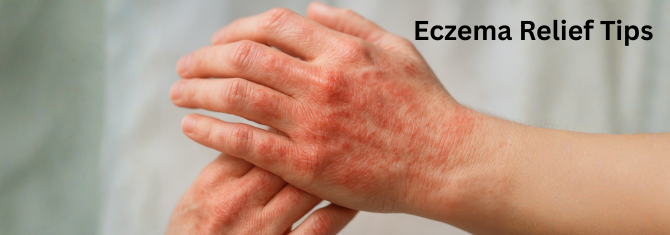Practical Ways to Calm Eczema Itch: Proven Tips for Real Relief in 2025
Persistent itching is one of eczema’s most frustrating symptoms. Beyond discomfort, it can disrupt sleep, affect mood, and lead to skin damage if scratching continues. Understanding what triggers the itch—and how to calm it effectively—can help eczema sufferers regain control, comfort, and long-term confidence in their skin’s natural health.

Understanding Why Eczema Itches
Eczema, or atopic dermatitis, is an inflammatory skin condition where the protective barrier is compromised. This allows irritants, allergens, and bacteria to penetrate more easily, triggering an overactive immune response. The result? Dry, red, and inflamed skin that itches intensely.
Researchers now know that eczema itch is not just a skin problem—it’s also neurological. When inflammation activates nerve endings, it creates a “itch-scratch cycle” where scratching offers momentary relief but ultimately worsens the irritation. Breaking this cycle is crucial for long-term comfort and healing.
Hydration Is Your First Line of Defense
Keeping your skin hydrated is essential. When skin dries out, micro-cracks form, making it more susceptible to itching and inflammation.
- Apply thick moisturizers—ointments or creams, not lotions—within three minutes of bathing to lock in moisture.
- Look for ingredients like ceramides, hyaluronic acid, and shea butter, which help repair the skin barrier.
- Avoid products with alcohol or fragrance, as they can worsen dryness.
For severe eczema, dermatologists often recommend the “soak and seal” method—a warm (not hot) bath for 10–15 minutes followed by immediate application of moisturizer.
Cool the Itch—Literally
Heat is a common trigger for eczema flare-ups. When your skin feels hot or inflamed, it’s signaling overactive nerves. Cooling the skin can provide instant relief:
- Use cold compresses or gel packs on itchy areas for 5–10 minutes.
- Keep a small bottle of thermal spring water spray in the fridge for on-the-go soothing.
- Choose breathable cotton fabrics and keep indoor temperatures moderate, especially at night.
Avoid scratching during flare-ups by patting or gently pressing the area instead. For children, soft cotton gloves at bedtime can prevent unconscious scratching.
Identify and Avoid Your Triggers
Eczema triggers differ from person to person, but recognizing your personal irritants can dramatically reduce flare frequency. Common triggers include:
- Harsh soaps or detergents
- Fragranced skincare and laundry products
- Dust mites and pet dander
- Wool clothing or synthetic fabrics
- Emotional stress or sweat buildup
Keeping a “skin diary” can help you pinpoint patterns between diet, stress levels, and flare-ups. Eliminating triggers—like switching to fragrance-free detergents or hypoallergenic skincare—can lead to noticeable improvement.
Consider Anti-Itch Topical Treatments
When moisturizers aren’t enough, targeted topical relief can help. Some over-the-counter and prescription options include:
- 1% Hydrocortisone cream: A mild corticosteroid for short-term inflammation relief.
- Calcineurin inhibitors (e.g., tacrolimus, pimecrolimus): Non-steroidal alternatives for sensitive areas like the face or eyelids.
- Topical antihistamines: Use sparingly; long-term application may irritate skin.
- Colloidal oatmeal creams: A natural way to calm itching and strengthen the skin barrier.
Always apply medications before moisturizers for best absorption and consult a dermatologist before mixing products.
Use Gentle Cleansing Habits
Many people with eczema unintentionally worsen symptoms through over-washing or harsh cleansers. Follow these dermatologist-approved guidelines:
- Limit showers to 10 minutes with lukewarm water.
- Avoid bubble baths and antibacterial soaps—they strip the skin’s protective oils.
- Use pH-balanced, soap-free cleansers labeled “for sensitive skin.”
- Gently pat (don’t rub) the skin dry after washing.
For infants and young children, adding a few drops of mineral oil or colloidal oatmeal to bathwater can offer additional soothing benefits.
Soothe from the Inside Out
Your diet and lifestyle choices also affect eczema symptoms. Anti-inflammatory nutrition and stress management can help support overall skin health.
- Eat foods rich in omega-3 fatty acids (salmon, flaxseed, walnuts) to reduce inflammation.
- Limit processed foods, dairy, and sugar, which can worsen itching in some individuals.
- Stay hydrated—aim for 8 glasses of water daily.
- Manage stress through mindfulness, yoga, or deep breathing, as stress hormones can intensify flare-ups.
Some people find relief from probiotics, which support gut health and may improve immune balance—though results vary.
Try Wet Wrap Therapy for Severe Flare-Ups
For intense itching or chronic eczema, wet wrap therapy can provide dramatic relief. After bathing and moisturizing, wrap the affected area in a layer of damp, soft cotton cloth followed by a dry layer. Leave it on for several hours or overnight.
This method helps:
- Rehydrate the skin deeply
- Reduce inflammation
- Prevent scratching during sleep
Wet wrap therapy should be done under medical supervision if used with prescription creams, as it increases absorption.